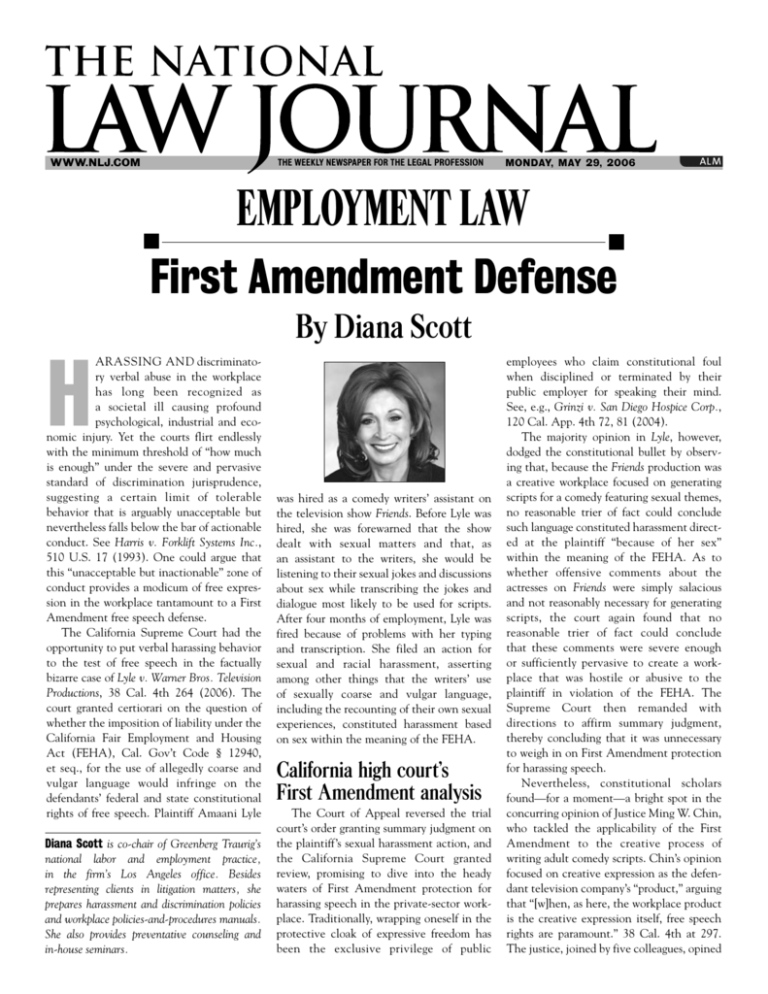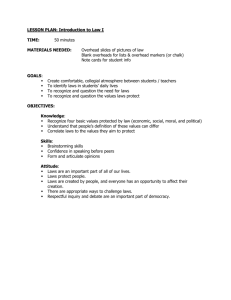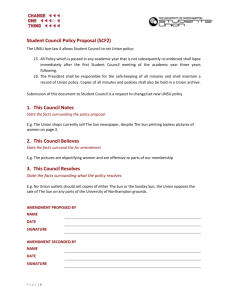
WWW.NLJ.COM
THE WEEKLY NEWSPAPER FOR THE LEGAL PROFESSION
MONDAY, MAY 29, 2006
EMPLOYMENT LAW
First Amendment Defense
By Diana Scott
H
ARASSING AND discriminatory verbal abuse in the workplace
has long been recognized as
a societal ill causing profound
psychological, industrial and economic injury. Yet the courts flirt endlessly
with the minimum threshold of “how much
is enough” under the severe and pervasive
standard of discrimination jurisprudence,
suggesting a certain limit of tolerable
behavior that is arguably unacceptable but
nevertheless falls below the bar of actionable
conduct. See Harris v. Forklift Systems Inc.,
510 U.S. 17 (1993). One could argue that
this “unacceptable but inactionable” zone of
conduct provides a modicum of free expression in the workplace tantamount to a First
Amendment free speech defense.
The California Supreme Court had the
opportunity to put verbal harassing behavior
to the test of free speech in the factually
bizarre case of Lyle v. Warner Bros. Television
Productions, 38 Cal. 4th 264 (2006). The
court granted certiorari on the question of
whether the imposition of liability under the
California Fair Employment and Housing
Act (FEHA), Cal. Gov’t Code § 12940,
et seq., for the use of allegedly coarse and
vulgar language would infringe on the
defendants’ federal and state constitutional
rights of free speech. Plaintiff Amaani Lyle
Diana Scott is co-chair of Greenberg Traurig’s
national labor and employment practice,
in the firm’s Los Angeles office. Besides
representing clients in litigation matters, she
prepares harassment and discrimination policies
and workplace policies-and-procedures manuals.
She also provides preventative counseling and
in-house seminars.
was hired as a comedy writers’ assistant on
the television show Friends. Before Lyle was
hired, she was forewarned that the show
dealt with sexual matters and that, as
an assistant to the writers, she would be
listening to their sexual jokes and discussions
about sex while transcribing the jokes and
dialogue most likely to be used for scripts.
After four months of employment, Lyle was
fired because of problems with her typing
and transcription. She filed an action for
sexual and racial harassment, asserting
among other things that the writers’ use
of sexually coarse and vulgar language,
including the recounting of their own sexual
experiences, constituted harassment based
on sex within the meaning of the FEHA.
California high court’s
First Amendment analysis
The Court of Appeal reversed the trial
court’s order granting summary judgment on
the plaintiff’s sexual harassment action, and
the California Supreme Court granted
review, promising to dive into the heady
waters of First Amendment protection for
harassing speech in the private-sector workplace. Traditionally, wrapping oneself in the
protective cloak of expressive freedom has
been the exclusive privilege of public
employees who claim constitutional foul
when disciplined or terminated by their
public employer for speaking their mind.
See, e.g., Grinzi v. San Diego Hospice Corp.,
120 Cal. App. 4th 72, 81 (2004).
The majority opinion in Lyle, however,
dodged the constitutional bullet by observing that, because the Friends production was
a creative workplace focused on generating
scripts for a comedy featuring sexual themes,
no reasonable trier of fact could conclude
such language constituted harassment directed at the plaintiff “because of her sex”
within the meaning of the FEHA. As to
whether offensive comments about the
actresses on Friends were simply salacious
and not reasonably necessary for generating
scripts, the court again found that no
reasonable trier of fact could conclude
that these comments were severe enough
or sufficiently pervasive to create a workplace that was hostile or abusive to the
plaintiff in violation of the FEHA. The
Supreme Court then remanded with
directions to affirm summary judgment,
thereby concluding that it was unnecessary
to weigh in on First Amendment protection
for harassing speech.
Nevertheless, constitutional scholars
found—for a moment—a bright spot in the
concurring opinion of Justice Ming W. Chin,
who tackled the applicability of the First
Amendment to the creative process of
writing adult comedy scripts. Chin’s opinion
focused on creative expression as the defendant television company’s “product,” arguing
that “[w]hen, as here, the workplace product
is the creative expression itself, free speech
rights are paramount.” 38 Cal. 4th at 297.
The justice, joined by five colleagues, opined
THE NATIONAL LAW JOURNAL
that limitations on sexual harassment should
be carefully tailored to avoid infringing on
First Amendment free speech rights in the
creative process. Chin conceded that
“[b]alancing the compelling need to protect
employees from sexual harassment with free
speech rights can, in some contexts, present
very difficult questions,” but he left the
“difficult questions” of free speech rights in
the ordinary workplace—where speech is
not an integral part of the product—to
another day.
The issue of First Amendment rights in
the private sector has perplexed legal scholars for years. The U.S. Supreme Court has
held that words which “by their very
utterance inflict injury” should not receive
constitutional protection. Chaplinsky v. New
Hampshire, 315 U.S. 568, 572 (1942). In
Aguilar v. Avis Rent-A-Car System Inc., 21
Cal. 4th 121 (1999), cert. denied, 529 U.S.
1138 (2000), California’s Supreme Court
upheld the imposition of an injunction
aimed at racist speech in the workplace
against the rental car giant and an individual
supervisor, despite claims that it would
violate First Amendment rights. The court
reasoned that the injunction was based on a
continuing course of repetitive speech that
had been judicially determined to violate the
FEHA. As such, prohibiting the defendants
from continuing to violate the FEHA did
not violate their First Amendment rights.
The defense of freedom of speech was,
however, squarely addressed in Grinzi v. San
Diego Hospice Corp. The plaintiff was terminated for her involvement in an allegedly
illegal investment scheme; she asserted
that the employer’s true motivation was
disapproval of her membership and speech
associated with the nonwork-related investment group. In upholding the dismissal of
her wrongful termination claim, the court
confirmed that “the First Amendment free
speech provision expresses a guarantee only
against action taken by the government,”
leaving private-sector employees without a
remedy. 120 Cal. App. 4th at 81.
Conversely, the availability of First
Amendment protections in the private
workplace was upheld in Novosel v.
Nationwide Insurance Co., 721 F.2d 894 (3d
Cir. 1983). In Novosel, a claims manager
declined to participate in his employer’s
efforts to lobby for support of the “No Fault
Insurance Reform Act.” He was terminated
shortly thereafter and asserted it was due to
MONDAY, MAY 29, 2006
his “privately-stated opposition to the
company’s political stand.” In upholding the
plaintiff’s ability to assert a violation of his
First Amendment right to free speech, the
court acknowledged that Novosel was not a
public employer, but held that “public
employee cases do not confine themselves to
the narrow question of state action. Rather,
these cases suggest that an important public
policy is in fact implicated whenever the
power to hire and fire is utilized to dictate
the terms of employee political activities.”
Id. at 900.
Concurring decision
in ‘Lyle’ all but drew
the road map for a
First Amendmentprotected
environment: the
creative workplace.
First Amendment intrigue is also present
in the 8th U.S. Circuit Court of Appeals’
opinion in Dossett v. First State Bank, 399
F.3d 940 (8th Cir. 2005). The plaintiff was a
bank employee who spoke her mind at an
after-hours public school district meeting,
criticizing the school district for not informing the public about the tax consequences of
a proposed merger. The school district was
an important bank client, and representatives immediately met with the plaintiff’s
supervisors to complain about her outspoken
views. Two weeks later, the bank terminated
her employment. She sued the bank pursuant to 42 U.S.C. 1983, alleging that it
conspired with the school district to terminate her employment in retaliation for
exercising her free speech rights at a public
hearing. The court agreed, noting that a
private employer can conspire with a
government actor to violate a citizen’s
constitutional rights to freedom of speech,
thereby upholding the claim against the
private employer.
First Amendment foothold
in the private workplace
Grinzi, Novosel and Dossett admittedly do
not involve behavior or speech targeted by
Title VII of the Civil Rights Act of 1964.
They do, however, involve speech that was
either voiced in or carried into the workplace, resulting in termination. These cases
demonstrate that the First Amendment
does have a foothold, however fragile, in the
private workplace, requiring at least a
respectful analysis before receiving a dismissive wave. But do these cases also suggest
that Title VII and its state counterparts
always provide a statutory exception for a
First Amendment defense against verbal
abuse? Not so fast.
Chin’s concurring decision all but drew
the road map for a new First Amendmentprotected environment called the “creative
workplace.” It recognized that the tension
between free speech and harassing conduct is
“especially serious ‘if the speech that creates
the hostile work environment is an inherent
part of the employer’s business,’ ” concluding
that “[i]t seems clear that...a female employee of an art gallery—or...of an adult bookstore—cannot claim that sexually explicit
materials from the workplace are creating a
hostile work environment.” 38 Cal. 4th at
297. Chin opined that the preferred remedy
in such cases is summary judgment in favor
of the critical right of free speech, “because
unnecessary protracted litigation would have
a chilling effect upon the exercise of First
Amendment rights.” Id. at 300.
The concurrence set out the road map
thusly: “If the complaint does not allege that
the offending conduct was pervasive and
directed at the plaintiff,...the court should
grant a demurrer.” It concluded: “[W]e must
not tolerate laws that ‘lead to timidity and
inertia and thereby discourage the boldness
of expression indispensable for a progressive
society.’ ” Id. at 300-301. Someone pass me
the binoculars—I think I see a new First
Amendment defense on the horizon. NLJ
This article is reprinted with permission from
the May 29, 2006 edition of the NATIONAL
LAW JOURNAL. © 2006 ALM Properties, Inc.
All rights reserved. Further duplication without permission is prohibited. For information, contact ALM,
Reprint Department at 800-888-8300 x6111 or
www.almreprints.com. #005-06-06-0001









